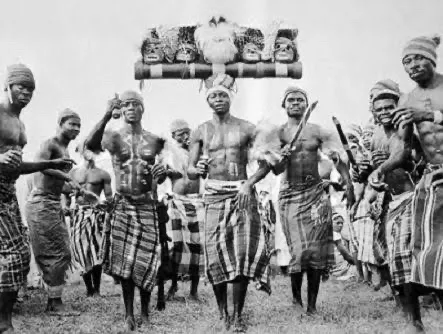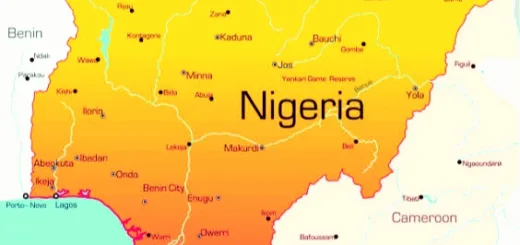Top 10 Oldest Tribes in Nigeria
Nigeria is a multi-ethnic country in the African continent with lots of tribes and languages. Although, the major tribes in Nigeria include: the Igbos, the Yorubas and the Hausas, there are other minorities scattered across different states in the federation that also make up part of the country. Before the creation or even the amalgamation of Nigeria in 1914, there were ancient tribes that existed with their own culture, form of government and religious practice.

Before year 1500, Nigeria’s current settlement were divided into kingdoms and not states as we have today. These ancient kingdoms identified themselves with ethnic groups names. Some of these early empires include: the Nupe Kingdom, Kanem-Borno Empire, Igala Kingdom, Igbo Kingdom of Nri, Oyo Empire, the Kingdom of Ife, Benin Kingdom, and the Sokoto caliphate. It was later in the 19th century, the Portuguese and the English came down to West Africa through Christian missionaries. These missionaries claim to have taught the natives how to read and write.
In this post, we shall look at ten of the oldest tribes in Nigeria and details about them. Kindly note that no one can pin-point the exact tribe that claim to be the oldest, but we have records that show that these 10 below are the oldest tribes in the country today.
Nigeria is a diverse country with over 197 million inhabitants that belong to one of 300 ethnic groups. Many indigenous tribes have distinct DNA markers because they are direct descendants of some of the earliest modern human populations. These tribes have distinct genetic and linguistic characteristics. Furthermore, despite English colonization, many tribes have been able to keep their cultural traditions for thousands of years. Which one of these tribes was the first to exist? Here’s a quick rundown of some of Nigeria’s oldest indigenous population groups.
The ten oldest tribes in Nigeria are shown below. This ranking is not based on any arbitrary criteria. Furthermore, we are simply putting these tribes in a non-official order based on historical facts and data.
TOP 10 OLDEST TRIBES IN NIGERIA
In no particular order, these are the ancient tribes in Nigeria and their details.
NUPE TRIBE
The Nupe tribe are regarded among the oldest tribes in the country and it is said that most dialects and languages that exits in the middle best is because of the Nupe people. You can find them in Niger state, Kwara, Kogi and the FCT respectively. The ancient Nupe Kingdom began in the mid 15th century around a basin between Niger state and the Kaduna rivers.
Most of the history learned about this ancient kingdom were mostly verbally-transmitted legends. It was said that King Jibiri was the first Nupe king that embraced the Islamic religion around 1770. Ma’azu was the ruler in the 1800’s when the Nupe kingdom enjoyed great success. It was after the death of Ma’azu that the Fulani conquest across Northern Nigeria through subsequent wars that led the Nupe Kingdom to be subjugated and become part of the Gwandu Emirate.
Presently, there are over 5 dialects used by the Nupe people which are the Bassa-Nge, Kupa, Kakanda, Dibo/Abawa and the Gana-Gana. The Nupe people are one of Nigeria’s oldest tribes. The Nupe ethnic group is at the heart of Nigerian art and culture, and most Middle Belt dialects may trace their roots back to them.
IGALA TRIBE
Igala are another old ethnic group in Nigeria that is worthy of mention as the Igala kingdom began in the 16th century which makes them one of the oldest tribe in the country. The former Igala Kingdom, was founded by Abutu-Eje during the 16th century and was ruled by nine high officials called the “Igala Mela”. These men were seen as the custodians of the sacred Earth shrine.
The first Ata (the ruler of Igala kingdom) was a woman named Ebule-Jonu. She was succeeded by her brother Agana-Poje, who was the father of Idoko his successor. Ayegba, led the popular war against Jukun and he was the second son of Idoko who succeeded his father as Ata’Gala. The Igala people are known for their bravery, settling in area formed by the Benue and Niger state rivers. They can also be found in Kogi state.
IJAW TRIBE
The Ijaw are a Nigerian ethnic group who live primarily in the Niger Delta. The states of Bayelsa, Delta, and Rivers contain considerable population clusters. They can also be found in other Nigerian states such as Ondo, Akwa Ibom, and Edo State, where they are long-term migrants. The Ijaws have a population of just over 10 million people, accounting for 1.8 percent of Nigeria’s population.
The Ijaws have lived in Nigeria’s Niger Delta region since 500 BCE, making them the country’s oldest tribe and one of the world’s oldest tribes.
KANURI TRIBE
The Kanuri are one of Nigeria’s most ancient tribes. They are divided into various subgroups and are known by different names in different locations.
The Kanuri language was the dominant language of the Bornu Empire, and it continues to be so now. The majority of Kanuri people live in Nigeria’s northeast area. There are around 3 million Kanuri speakers in the country.
Bornu’s ceremonial Emirate can be traced back to the Kanem-Bornu empire, which was created around 1000 CE. According to Kanuri legend, Sef, the son of Yemen’s Dhu Ifazan, landed in Kanem in the ninth century and founded the Sayfawa dynasty. At Zilum, in the Lake Chad region, evidence of indigenous state development dates back to around 800 BCE.
GBAGYI TRIBE
The Gbagyi are one of Nigeria’s oldest tribes. They are recognized for being peace-loving, open, and accommodating individuals. The Gbagyi have formed as a distinct group of Nigerians, with a culture that reflects their understanding of the universe.
The Gbagyi tribe’s history appears to be centered in a large belt of varied terracotta productions. Other clay traditions found along the belt are rather old. The one from Daima (near Nigeria’s northern border) has been dated between 600 B.C. and A.D. 1100, while the one from Yelwa has been dated between the second and seventh centuries A.D.
The Gbagyi first encountered Islam in the 19th century, during the Sokoto Jihad of 1804, then Christianity in the 20th century, via southerners.
BENIN TRIBE
The Edo, or Benin, people of Edo state are one of Nigeria’s oldest tribes. They are Edo descendants who speak the Edo language. The name “Benin” (and “Bini”) is a Portuguese corruption of the word “Ubini,” which first appeared in usage around 1440 during the reign of Oba (ruler) Ewuare the Great.
Edo people are found in Nigeria’s Edo State, which takes its name from the population of Benin City, the region’s most significant historical conglomeration. Many related groups exist in Edo’s near surrounds, which are likewise bounded by political and administrative limits. The majority of these organizations may trace their roots back to the medieval Benin City.
YORUBA TRIBE
The Yoruba people are also one of Nigeria’s oldest tribes. In Africa, there are over 35 million Yoruba people. This ethnic group are mostly from Nigeria, where they account for 15.5 percent of the population.
The Yoruba are one of Africa’s most urbanized populations. For ages, the majority of Yorubas have lived in well-organized urban centers centered on powerful city-states and the Oba’s residence. Most of these settlements were fortresses with huge walls and gates in ancient times.
Cities in Yoruba have long been among Africa’s most populous. Ibadan, one of the major Yoruba cities created in the 1800s, was also the largest metropolis in Sub-Saharan Africa for a long time. Lagos, another important Yoruba metropolis, is still Africa’s largest city today.
HAUSA TRIBE
Throughout West Africa, there are predominantly Hausa-speaking communities. The Hausa people have traditionally lived in small settlements and precolonial towns and cities. They speak Hausa, an Afro-Asian language used by the Chadic people.
Historically, the Hausa aristocracy had established an equestrian culture. The Hausa Nok civilisation arose in northern Nigeria approximately 1000 BCE and perished in the West African region around 300 AD for unknown reasons. It is thought to be the offspring of an ancestral nation that split to form the Hausa. The social structure of Nok is supposed to have been sophisticated. The Nok civilisation is said to be the first to make life-sized Terracotta in Sub-Saharan Africa.
IGBO TRIBE
The Igbo people are also one of Nigeria’s oldest tribes. They are a meta-ethnicity that originated in what is now southern and southeastern Nigeria. The Igbo people are one of Africa’s most populous ethnic groups. The Niger-Congo language family includes the Igbo language.
The origins of the Igbo people have been the subject of much conjecture, as it is unclear how the community came to be. The Igbo were a politically divided people before British colonial authority in the twentieth century. The Igbo developed a strong sense of ethnic identity following decolonization. The Igbo areas seceded as the short-lived Republic of Biafra during the Nigerian Civil War (1967–1970).
IBIBIO-EFIK TRIBE
The Ibibio people live on the coast of southern Nigeria. They are usually found in the states of Akwa Ibom and Cross River. They have kinship with the Annang and Efik peoples. The Cross River branch of Benue–Congo has a large dialect cluster called Efik-Ibibio.
The Ibibio people live in the palm belt of southeast Nigeria and are considered the oldest of all Nigerian ethnic groupings. The Ibibio people are thought to be the first group to settle in southern Nigeria. They are thought to have arrived in their current location approximately 7000 B.C. Despite historical evidence, it is unclear when the Ibibio arrived in the state.
EBIRA TRIBE
The Ebira people are a central Nigerian ethnolinguistic group. Many Ebira people come from the states of Kogi, Kwara, Nasarawa, and Edo. These ancient Nigerian tribe came into confrontation with Fulani warlords to the north and west during the conquest of Hausa country by the forces of religious and political leader Uthman Dan Fodio. Igu (Koton Large) and Igu (Koton Small) were founded in the middle of the nineteenth century. They fought with jihadists from Bida and Ilorin between 1865 and 1880. The Fulanis, on the other hand, did not conquer the Ebiras. The inherent protections of their steep terrain aided them in part.

